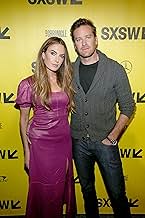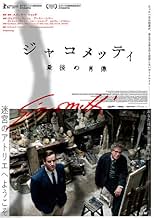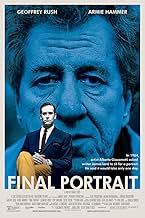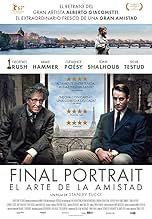NOTE IMDb
6,3/10
6,3 k
MA NOTE
L'histoire du peintre et sculpteur suisse, Alberto Giacometti.L'histoire du peintre et sculpteur suisse, Alberto Giacometti.L'histoire du peintre et sculpteur suisse, Alberto Giacometti.
- Réalisation
- Scénario
- Casting principal
- Récompenses
- 1 nomination au total
Laura Bernardeschi
- Café Customer
- (non crédité)
Maja Bloom
- French Girl in the Dream
- (non crédité)
Marina Capasso
- Italian Friend of Giacometti
- (non crédité)
Laetitia Cazaux
- French Prostitute
- (non crédité)
Begoña Fernández Martín
- Graveyard Woman
- (non crédité)
Dolly Jagdeo
- Party Girl
- (non crédité)
Avis à la une
The search for perfection is an endless workflow. It is a routine in which there is always time for a walk with a friend, an affair with a muse or a fight with a wife.
The peculiarity of this picture is that Tucci does not dramatize the reality of life. He shows everything as it happens in it. A good well-done shot story about the true love of artists for their craft.
The peculiarity of this picture is that Tucci does not dramatize the reality of life. He shows everything as it happens in it. A good well-done shot story about the true love of artists for their craft.
Luckily this movie isn't that long because there isn't that much story. But nevertheless it's interesting for a look a the creative process of one of the most famous sculptors in the world. This isn't a sweeping biopic of the artist's life just a segment.
Geoffrey Rush is effective as the sculptor trying to paint a painting and starting over and over again. His subject is an art critic played by Armie Hammer who looks elegant as he poses in his suits. Clemence Poesy plays a prostitute mistress of Giacometti.
Worth a watch if you are interested in Giacometti.
Geoffrey Rush is effective as the sculptor trying to paint a painting and starting over and over again. His subject is an art critic played by Armie Hammer who looks elegant as he poses in his suits. Clemence Poesy plays a prostitute mistress of Giacometti.
Worth a watch if you are interested in Giacometti.
I wanted to see this movie because I like Geoffrey Rush and Tony Shalhoub. I'd never seen a movie directed by Stanley Tucci, either, so that interested me. I took myself to see this, and expected a semi-art house flick. This was... OK, in my opinion. Here's why:
The Good: The acting is good, which means the directing was good. Well acted and directed in my opinion.
The Bad: There's a bit more than the good, unfortunately. The scenes get a little repetitive after a while, there's a dark color tone to the film that takes a little while to get used to, and I don't feel like you really have a reason to care about the characters. You get left in the dark, just kind of wondering what's taking so long for this man to finish the portrait. He's all over the place. Sometimes studying his drawing, sometimes carousing his mistress, sometimes cursing up a storm. It's an odd situation, watching this film. I didn't dislike it, as some of the other patrons in my theater did, but I don't see a reason to revisit it. So... I'll give it 5/10.
The Good: The acting is good, which means the directing was good. Well acted and directed in my opinion.
The Bad: There's a bit more than the good, unfortunately. The scenes get a little repetitive after a while, there's a dark color tone to the film that takes a little while to get used to, and I don't feel like you really have a reason to care about the characters. You get left in the dark, just kind of wondering what's taking so long for this man to finish the portrait. He's all over the place. Sometimes studying his drawing, sometimes carousing his mistress, sometimes cursing up a storm. It's an odd situation, watching this film. I didn't dislike it, as some of the other patrons in my theater did, but I don't see a reason to revisit it. So... I'll give it 5/10.
Loved the film, it is definitely not for everyone, as an art student it was rather interesting to see an artists process of making a painting. The film itself is rather small, it is centred around one particular event. The acting is great. I would recommend it to artists and people who are interested in creative process of making an artwork.
If you enjoy watching paint dry this is your film. Imagine an artist who is unable to finish a painting without needing to start again
and again. That is the basic premise of Final Portrait (2017). It's a bio-pic that looks into the idiosyncratic mind of renown Swiss artist Alberto Giacometti (Geoffrey Rush) in a story so lacking in forward narrative that many will be left wondering why they watched it at all.
Based on real events, Final Portrait is an adaptation of a memoir by American writer James Lord (Armie Hammer) who is flattered when asked to pose for a portrait by Giacometti. Believing it may be a single session, it turns out to take almost three weeks of daily sittings. The artist lives amidst chaotic mess with a long-suffering wife who tolerates his obsession with a prostitute girlfriend. He hates banks; prefers to hide cash under his studio rubble; has few social filters; and is liked by all despite a tendency insult others. The portrait sessions are constantly interrupted by long walks, drinks at nearby bars, and frequent outbursts due to chronic perfectionism that ensures his works are never finished. He is unable to walk past his clay sculptures without making a change and some are so altered that they are reduced to stick figures. Lord's amused and bewildered fascination with the life of a creative genius keeps him cancelling his return flight to America just to see his final portrait.
The nineteen-day timeframe feels like the same event repeated nineteen times (mercifully, with some time compressions). Along the way, we watch the deeply etched face of the cantankerous Giacometti as he grimaces in self-rebuke, lusts after his girlfriend, and gazes deeply into the gaze of James Lord to search not for the look but the inner soul of another human being. If you can forgive Geoffrey Rush's Aussie-Swiss accent, there is much to admire in his characterisation of an angst-ridden artist. But it is also wearingly repetitive. Lord is the master's foil as the suited slick- back straight guy. Initially adrift in the world of an erratic painter, he is conservative and upright yet his vanity is drawn like a moth to the flame of genius, eager to understand Giacometti's creativity. While both play their part brilliantly, it is Geoffrey Rush who dominates the screen. The studio set is cluttered and claustrophobic, like the artist's mind, and the cinematography employs the shallow depth-of-field effect to dwell on detail, allowing sharply focused faces to peer between blurred works of art as if to say these are but points in time that will never find their final form.
There are clever ironies in watching a painter who studies his subject, while the subject studies the painter. It's a three-way mirror between audience, Rush and Lord. But such existential twists are not enough to elevate this film to a level of great meaning. Viewers enthralled by this field of art might enjoy the story but most others may struggle. It's like a moment in time that lasts nineteen weeks, then compressed into ninety minutes. There is little to look forward to as the ending has no more meaning than the beginning but is far more welcomed.
Based on real events, Final Portrait is an adaptation of a memoir by American writer James Lord (Armie Hammer) who is flattered when asked to pose for a portrait by Giacometti. Believing it may be a single session, it turns out to take almost three weeks of daily sittings. The artist lives amidst chaotic mess with a long-suffering wife who tolerates his obsession with a prostitute girlfriend. He hates banks; prefers to hide cash under his studio rubble; has few social filters; and is liked by all despite a tendency insult others. The portrait sessions are constantly interrupted by long walks, drinks at nearby bars, and frequent outbursts due to chronic perfectionism that ensures his works are never finished. He is unable to walk past his clay sculptures without making a change and some are so altered that they are reduced to stick figures. Lord's amused and bewildered fascination with the life of a creative genius keeps him cancelling his return flight to America just to see his final portrait.
The nineteen-day timeframe feels like the same event repeated nineteen times (mercifully, with some time compressions). Along the way, we watch the deeply etched face of the cantankerous Giacometti as he grimaces in self-rebuke, lusts after his girlfriend, and gazes deeply into the gaze of James Lord to search not for the look but the inner soul of another human being. If you can forgive Geoffrey Rush's Aussie-Swiss accent, there is much to admire in his characterisation of an angst-ridden artist. But it is also wearingly repetitive. Lord is the master's foil as the suited slick- back straight guy. Initially adrift in the world of an erratic painter, he is conservative and upright yet his vanity is drawn like a moth to the flame of genius, eager to understand Giacometti's creativity. While both play their part brilliantly, it is Geoffrey Rush who dominates the screen. The studio set is cluttered and claustrophobic, like the artist's mind, and the cinematography employs the shallow depth-of-field effect to dwell on detail, allowing sharply focused faces to peer between blurred works of art as if to say these are but points in time that will never find their final form.
There are clever ironies in watching a painter who studies his subject, while the subject studies the painter. It's a three-way mirror between audience, Rush and Lord. But such existential twists are not enough to elevate this film to a level of great meaning. Viewers enthralled by this field of art might enjoy the story but most others may struggle. It's like a moment in time that lasts nineteen weeks, then compressed into ninety minutes. There is little to look forward to as the ending has no more meaning than the beginning but is far more welcomed.
Le saviez-vous
- AnecdotesLondon doubled for Paris in the film because they couldn't afford to film in Paris. Filming took place over a week and a half and CGI was used to make it look like Paris. According to Tucci, it was cheaper for a small film to use CGI than to visit the real location.
- Citations
[first lines]
James Lord: [narrating] In 1964, I was a young writer living in Paris. I had written a few articles about Alberto Giacometti, who was one of the most accomplished and respected artists of his generation. I had become good friends with Giacometti and his brother, Diego. And one day, after an exhibition, he asked me to sit for a portrait. He told me it would take no longer than two to three hours. An afternoon at the most.
- ConnexionsFeatured in Conan: Armie Hammer/Nick Swardson (2018)
- Bandes originalesJazz à Gogo
Music by Alain Goraguer
Lyrics by Robert Gall
Published by Editions Bagatelle / EMI Music Publishing Ltd
Performed by France Gall
Courtesy of Polydor Records (France)
Under licence from Universal Music Operations Ltd
Meilleurs choix
Connectez-vous pour évaluer et suivre la liste de favoris afin de recevoir des recommandations personnalisées
- How long is Final Portrait?Alimenté par Alexa
Détails
- Date de sortie
- Pays d’origine
- Sites officiels
- Langues
- Aussi connu sous le nom de
- Final Portrait
- Lieux de tournage
- Ruby's Bar & Lounge, 76 Stoke Newington Road, Londres, Angleterre, Royaume-Uni(old truck and french restaurant scene)
- Sociétés de production
- Voir plus de crédits d'entreprise sur IMDbPro
Box-office
- Montant brut aux États-Unis et au Canada
- 461 972 $US
- Week-end de sortie aux États-Unis et au Canada
- 25 472 $US
- 25 mars 2018
- Montant brut mondial
- 1 677 835 $US
- Durée1 heure 30 minutes
- Couleur
- Mixage
- Rapport de forme
- 2.35 : 1
Contribuer à cette page
Suggérer une modification ou ajouter du contenu manquant

Lacune principale
By what name was Alberto Giacometti, the Final Portrait (2017) officially released in India in English?
Répondre




































